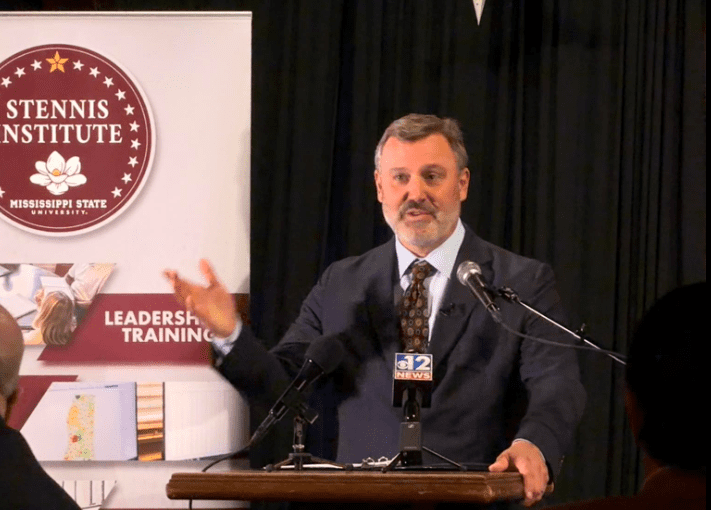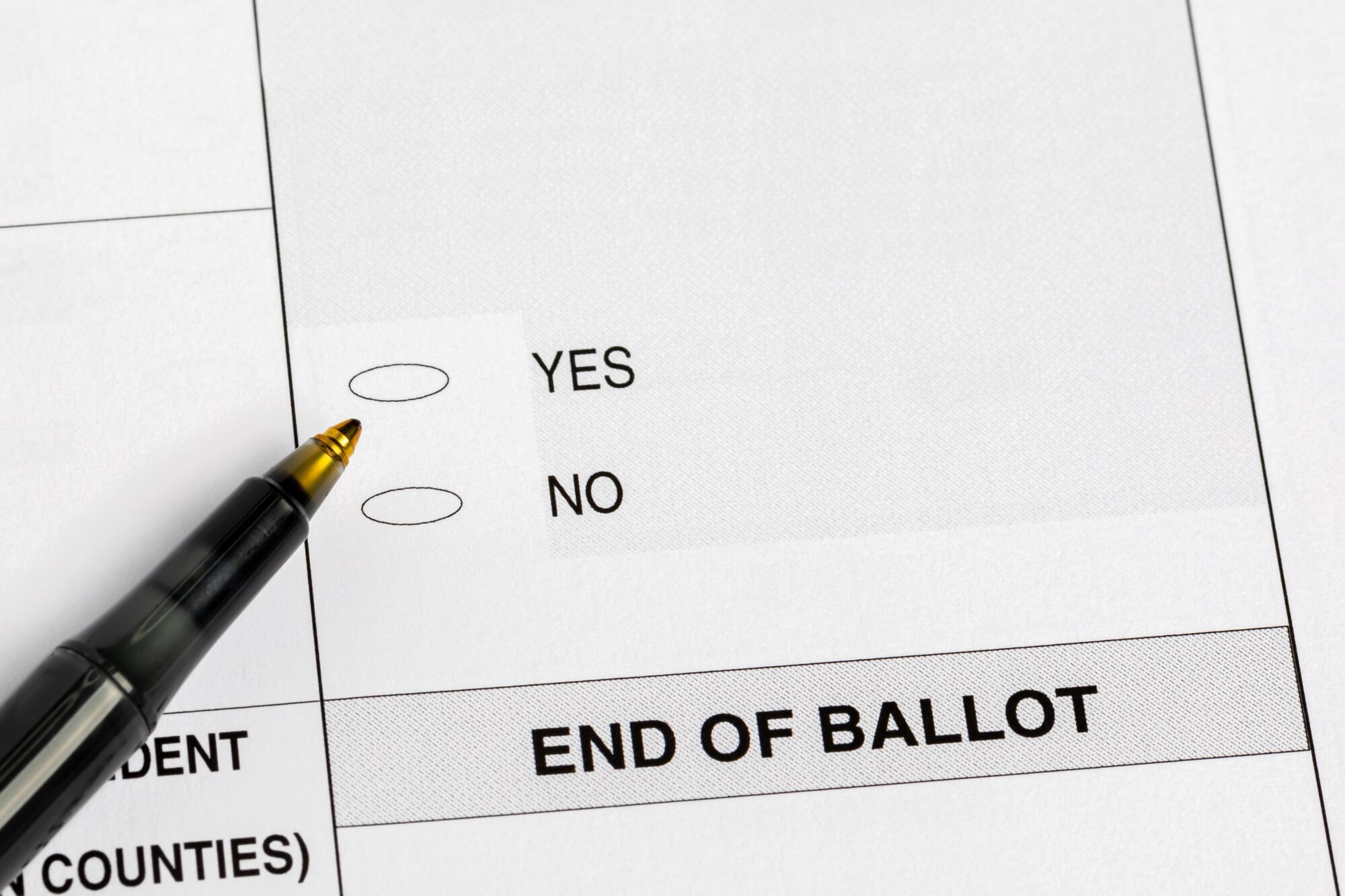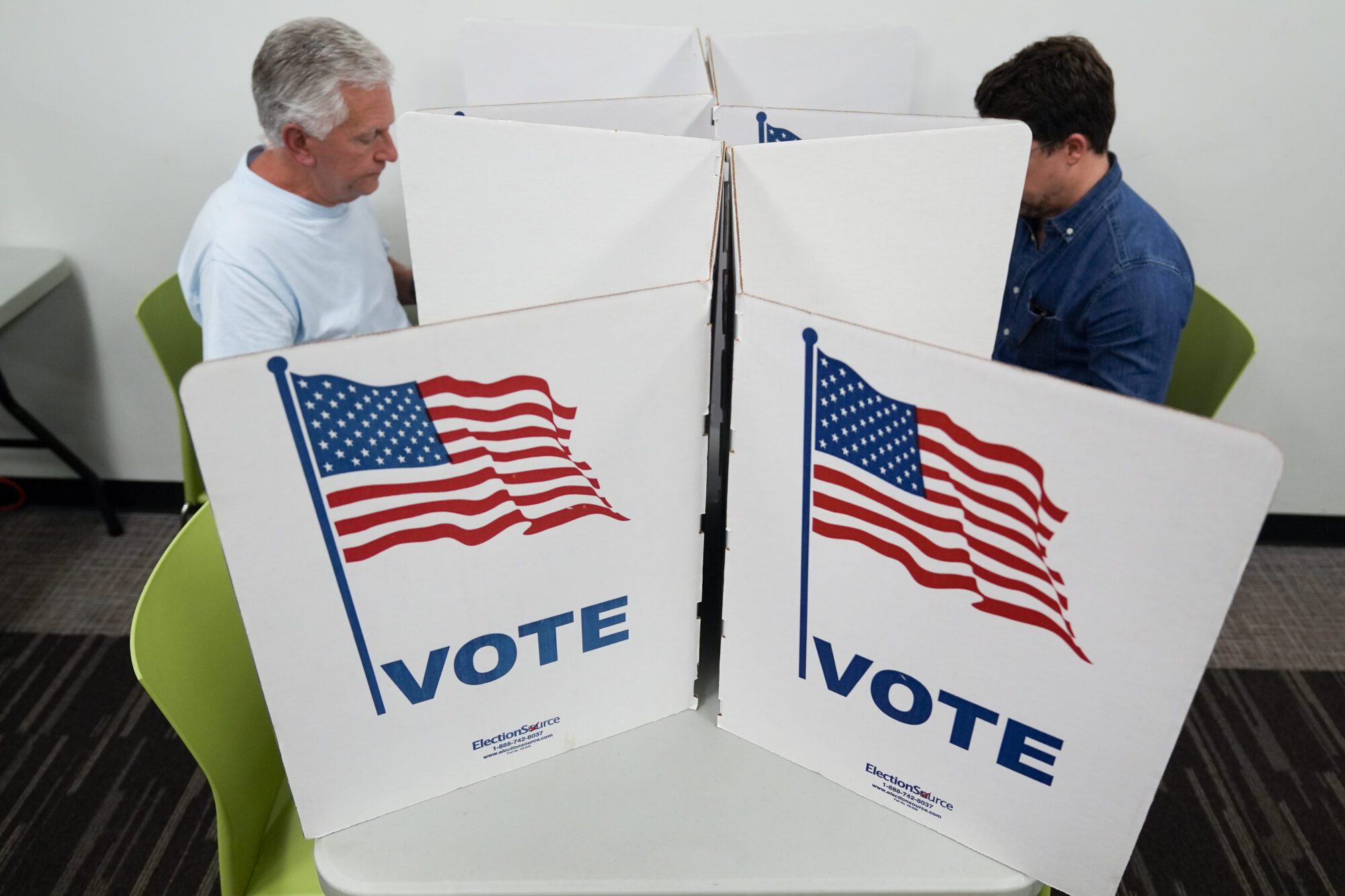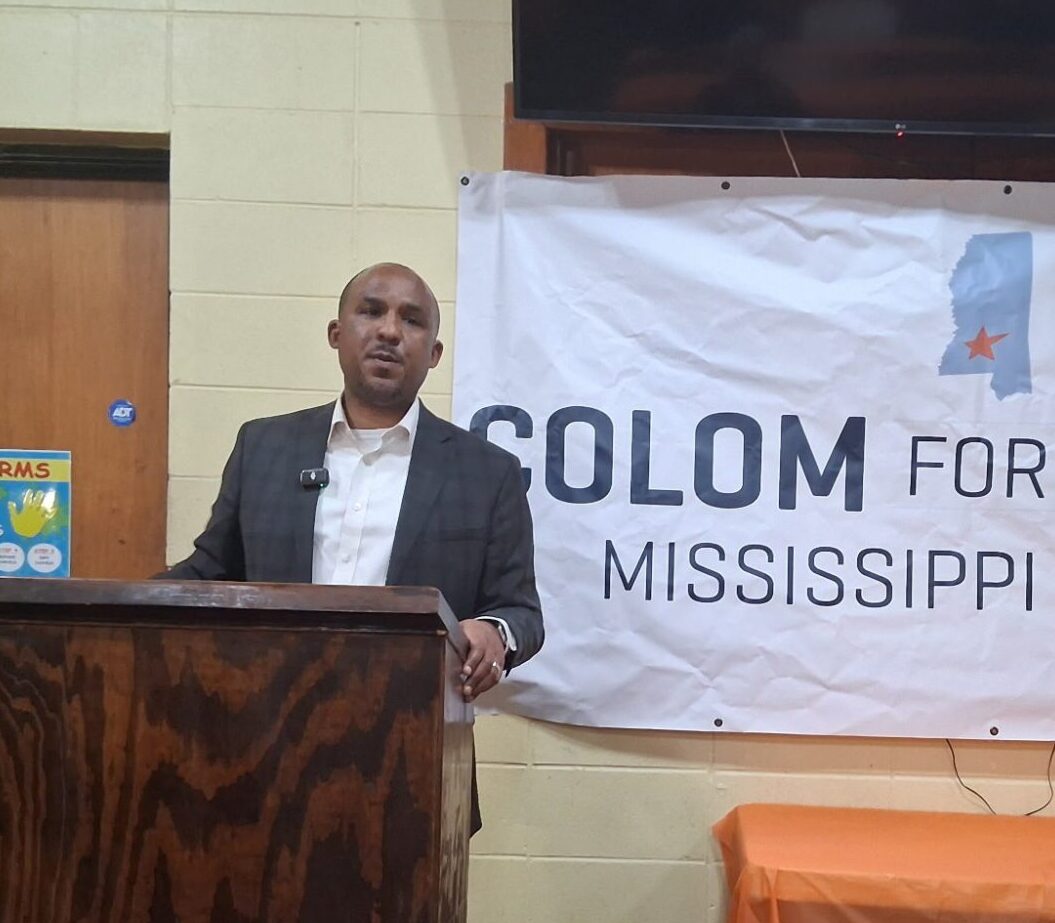
Scott Colom speaking at a town hall on Nov, 24, 2025 (Photo by Daniel Tyson | Magnolia Tribune)
- If elected, the Democrat candidate for U.S. Senate said Monday the first bill he would introduce would be to erase the Trump administration’s cuts to Medicaid.
Campaigning in Jackson Monday night, U.S. Senate candidate Scott Colom, a Democrat, said a tax increase is needed on high-income earners to allow Mississippians to have health insurance and save state hospitals.
Colom’s campaign stop at Shady Grove Baptist Church had the Senate hopeful talking extensively about federal cuts to Medicaid and how he believes those cuts will adversely impact Mississippians. He said the Trump administration hopes people will become frustrated from being buried in paperwork and not seek coverage.
“What will happen is people will go without healthcare,” Colom said. “When they go to the hospital, because ultimately things go wrong, and those hospitals are not going to be compensated, they are going to lose money.”
This will lead to the closure of some hospitals in Mississippi, he claimed.
“We have to cancel the health care cuts. We have to raise taxes 3 percent on people making more than $600,000 a year to pay for Mississippians to continue to have health insurance, and to save our hospitals,” he said.
Colom’s comments come despite the fact that high-income earners already pay a higher effective tax rate, accounting for the bulk of income tax collected by the federal government, as shown in research from the Tax Foundation.
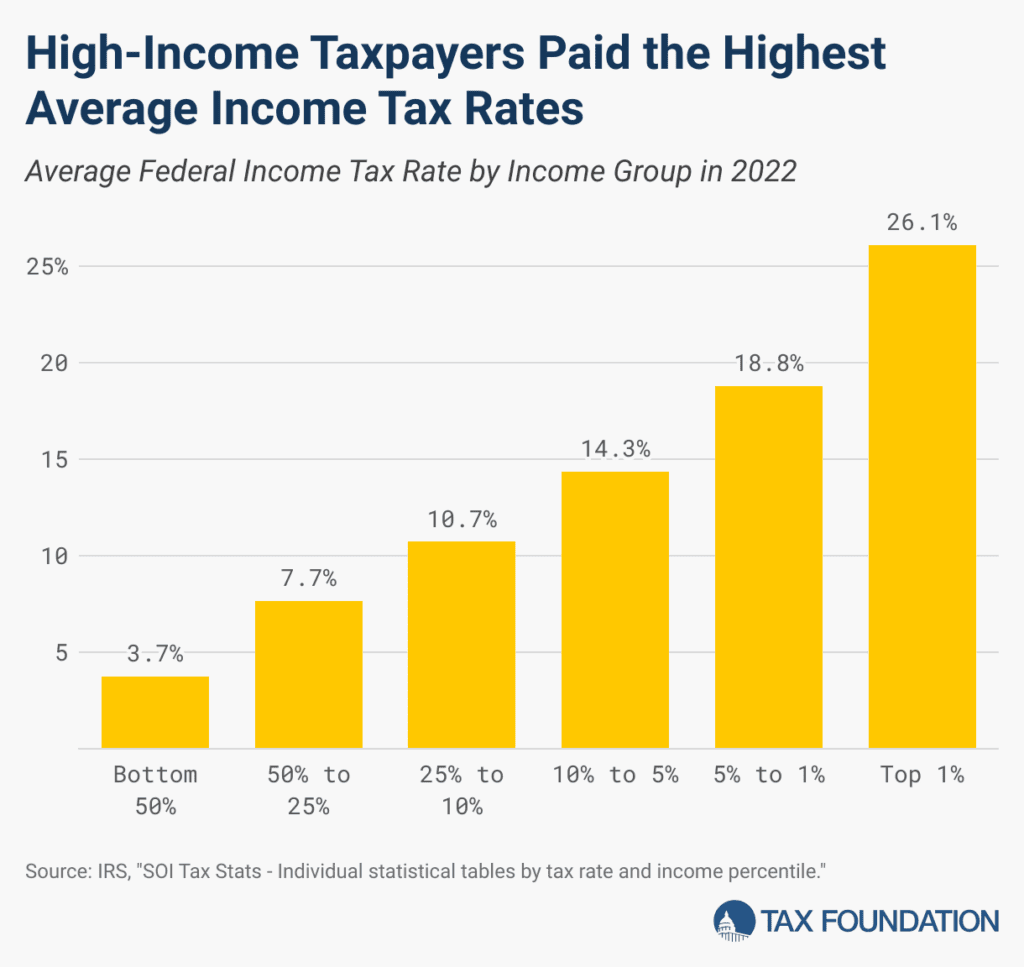
According to the Congressional Budget Office, the One Big Beautiful Bill Act seeks to cut more than $1 trillion over 10 years from Medicaid while increasing work requirements and implementing more frequent eligibility checks. Advocates say the reduction will come from increased focus on reducing waste, fraud, and abuse while getting able-bodied persons back to work.
Jonathan Bain, a Senior Research Fellow with the Foundation for Government Accountability, said despite common claims, Medicaid dependency has not saved rural hospitals.
“Four of the five states with the highest number of rural hospitals at risk of closure are Medicaid-expansion states, including neighboring Arkansas, and since 2014, 74 hospitals in expansion states have closed their doors,” Bain told Magnolia Tribune. “Mississippi has a far better path forward through the Rural Health Transformation Program contained in the One Big Beautiful Bill, which has the potential to allocate as much as $1 billion in rural health funding to Mississippi.”
Bain said many of the Medicaid reforms in the bill do not affect Mississippi at all, “because the state has not expanded Medicaid and does not rely on those federal funds to keep its health-care system afloat.”
“The bottom line is that Mississippi would benefit from new funding to support its rural health care system and additional federal tools and efforts to crack down on Medicaid waste, fraud, and abuse,” Bain said.
If elected, Colom said the first bill he would introduce would be to erase the Trump administration’s efforts to decrease Medicaid coverage.
Colom is seeking the Democratic Party’s nomination in what is now a three-person primary in Mississippi. He has raised roughly $570,000, according to his first campaign finance filing, and reported $576,000 cash on hand.
Priscilla Till and Albert Littell are the other two Democrats seeking their party’s nomination for U.S. Senate in Mississippi. Others could join the fray before the qualifying deadline in late December. However, Colom is by all accounts the Democratic Party’s preferred candidate in the race.
READ MORE: Democrats get their man: Colom’s entry in Mississippi U.S. Senate race has been years in the making
At his Monday campaign event, Colom went on to say that Mississippians deserve better representation in the nation’s capital, a senator who is not afraid to fight for Mississippi. He questioned the allegiance of incumbent U.S. Senator Cindy Hyde-Smith (R), saying she is beholden to Washington D.C., not Mississippi.
“The reality is that Cindy Hyde-Smith has quit,” he said, claiming that Hyde-Smith is not helping the state’s farmers and will not fight for Mississippians’ health care. “She isn’t focused on Mississippi, but D.C. No, she’s focused on wanting to keep her job.”
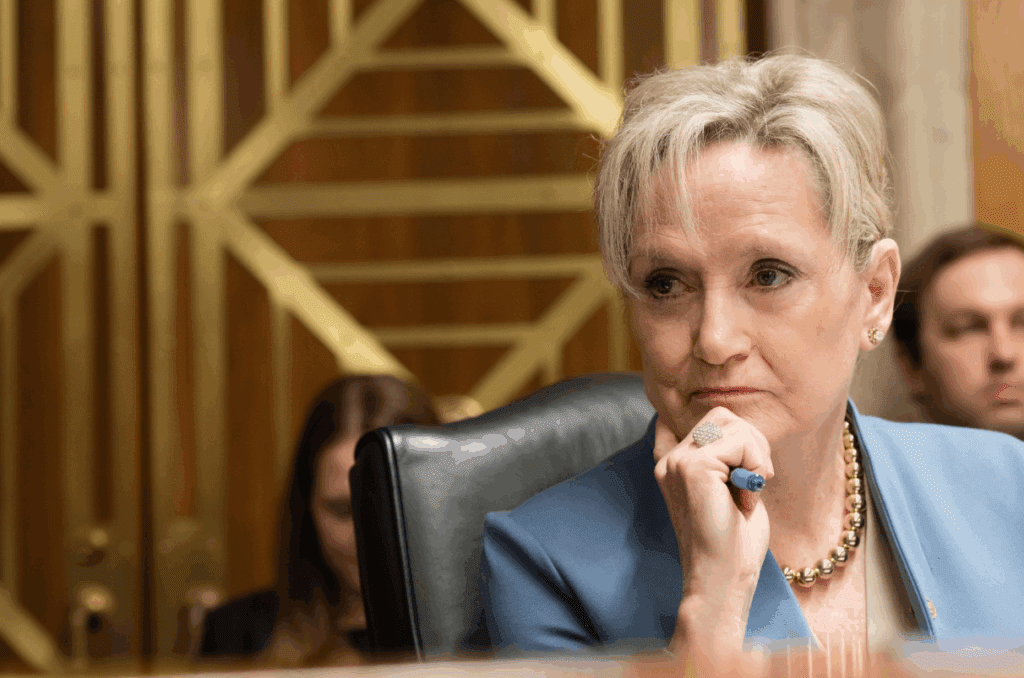
Senator Hyde-Smith, who sits on the Senate Appropriations and Agriculture Committees, backed the One Big Beautiful Bill Act. She has said that the law offers a critical safety net for family farmers, so they can continue producing an abundant supply of food and fuel for America.
Following the law’s passage, Hyde-Smith shared that the One Big Beautiful Bill modernizes the farm safety net and responds to current market factors by significantly increasing reference prices and crop insurance subsidies.
In October, Senator Hyde-Smith used her time in the Senate chamber to highlight the seriousness of the problems facing farmers and rural communities in a floor speech.
““Farmers are still facing impossible choices about whether they can afford to plant next year or stay in business at all. I fully support ongoing work to provide additional federal bridge funding before the end of the year to ensure more of our family farms can stay in business,” Hyde-Smith said at the time. “We all represent different sectors of American agriculture, but the crisis doesn’t discriminate. It spans commodities, regions, and party lines. What matters now is that we come together with urgency and with purpose. Our farmers are counting on us. It’s time for Congress to meet the moment before it’s too late.”
During a question-and-answer session, Colom was asked how he would work with other members of the Senate if elected. The District Attorney for Lowndes, Oktibbeha, Clay and Noxubee counties said he would work across the aisle, mentioning Alaska U.S. Senator Lisa Murkowski and Missouri U.S. Senator Josh Hawley as Republicans he would like to engage. He praised Murkowski for using her vote on the One Big Beautiful Bill to gain funding for rural health care and clean energy tax credits. Colom also said he would like to work with Hawley to help roll back the cuts in Medicaid and Medicare.
When asked about President Donald Trump’s tariffs, Colom said they are a detriment to Mississippi. He said tariffs have had a negative impact on Magnolia State farmers, who once sold approximately half of their soybeans to China.
“Now, they sell zero, zero,” he said. “And now China buys their soybeans from Argentina, which we just gave $40 billion. So, the tariff policies are also hurting Mississippi farmers.”
Colom also touched on education and crime, saying teachers and law enforcement officers should not have to pay income taxes. When questioned about his stance, Colom said Mississippi is losing a high number of law enforcement officers to other states.
Notably, Mississippi is in the middle of a plan to phase out the income tax for all working Mississippians in the next decade, a measure backed by Republicans with scant Democrat support.
The comment drew some pushback from the mostly black audience as it pertains to law enforcement’s relationship with the black community.
Colom told the story of a time when he was interviewing a defendant in a murder case, using it as an example of holding law enforcement accountable as a District Attorney. During the interview, he conveyed that a woman said she was being sexually assaulted by an officer at the jail and gave enough details to merit an investigation. That investigation found three officers were sexually assaulting inmates, and the sheriff knew. All were prosecuted in federal court, he said.
Colom believes two steps will help mend the strained relationship between the black community and law enforcement. The first is more engagement from the public and the second is to sit on a grand jury. Many voters try to get out of their civic responsibility, but that “takes away your voice and the voice of citizens,” he said.
As for his race against an incumbent U.S. Senator, Colom, a seventh-generation Mississippian, said he learned a valuable lesson from his mother. She told him to never quit.
“Cindy Hyde-Smith may have quit on Mississippi, but I won’t,” he told the audience.
The qualifying period for those running for a seat in the U.S. House or U.S. Senate in Mississippi opens December 1 and ends December 26.
Party primary elections will be held March 10, 2026, and the General Election is slated for November 3, 2026.



